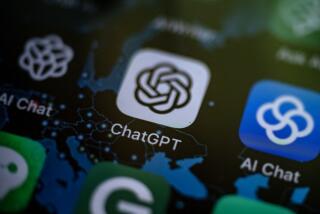Feeling sick? How about a house call from a doctor? A new app, Heal, makes it happen
- Share via
When Dr. Renee Dua’s son was 7 months old, she and her husband had to take him to a hospital emergency room for what ended up being a non-threatening condition.
Still, it took eight hours of waiting around to be told that.
“I wondered why two reasonably intelligent people would have to go through something like that,” said Dua, a specialist in nephrology with a private practice in Northridge. “I said to my husband, ‘There’s got to be a better way.’”
Within five weeks, Dua’s entrepreneur husband had developed an Uber-like app that would allow a doctor to be sent to someone’s home or office at an hour’s notice. The service — Heal — launched in February and thus far has raised $6.5 million from investors who include Qualcomm Executive Chairman Paul Jacobs, United Talent Agency Managing Director Jay Sures and entertainer Lionel Richie. It has a network of 100 doctors in Los Angeles County, Orange County, San Francisco and Silicon Valley who offer house calls at a flat rate of $99 per patient.
Responding to a summons on the app, a doctor arrives at the patient’s location accompanied by a medical assistant and with a host of supplies. Patients are handed two forms: one consenting to treatment and one a new patient form, to fill out with details of their medical backgrounds. Doctors typically deal with things such as sore throats, dog bites, prescription refills and other primary care issues.
“Patients have come to realize how inconvenient it is to go and see a doctor these days,” said Dua, who plans to expand Heal to 15 more cities across the country in the next year. “You take half a day off work, drive through traffic, pay for parking and see a doctor for 10 minutes after waiting for an hour in a room where you don’t know who else is sick. Having a doctor come into your own home where you are comfortable — that’s how patients want to see doctors.”
Matt Biel, an IT consultant who lives in Mar Vista, has used Heal four times for himself and his children and says that he sees it as “that first point of contact with a doctor, where you want to ask, ‘Should I be concerned about this?’”
“It was like you see in the movies from a hundred years ago, when a doctor comes in, asks questions, takes his time,” Biel added. “It’s great for everything that’s not an emergency.”
Apps like Heal are part of a burgeoning movement using the latest digital technologies to facilitate healthcare with a view to bringing down costs and eliminating frustration among patients. The app can also be used to schedule tests and in-home follow-up visits and routine physicals. Some insurance plans already include Heal in their networks, and Dua is working to sign up others.
Biel says he would have been charged around $150 to see his regular doctor instead of the $99 for the Heal house call. He says he uses Heal not to save money but to save time. “If I had called my regular doctor, I would have had to fit into their schedule — probably the next day — fight traffic, find parking and wait an hour in the waiting room.”
The setup works well for doctors who like flexibility. Most have their own practices or jobs at other clinics and sign on with Heal to work during blocks of time when they are available. Almost since the service began, Dr. Faisal Chawla, a pediatrician affiliated with Children’s Hospital Los Angeles, has been a Heal doctor when his schedule allows.
“This on-demand concept is around for everything else, and it’s a very unique way of approaching medicine,” he said. “It’s a strong shift in healthcare when everyone is realizing that hospitals and clinics are too busy, and we need to get doctors out to the community in other ways.”
He says he sees afflictions typical of childhood — fevers, croup, infections.
“There’s really no need for a child to go into a clinic for those things,” he said. “Whether they’re in a clinic or at home, they’re going to get the same treatment. And at first I thought going into someone’s home would be weird. But they welcome you. They’re already letting you in, so the walls come down anyway.”
ALSO:
Should you be worried about the mercury in your teeth?
Why are ‘holistic’ dentists on the rise? They treat the whole body, not just teeth
Neuroplasticity - the brain’s ability to adapt - offers hope to those with debilitating diseases






